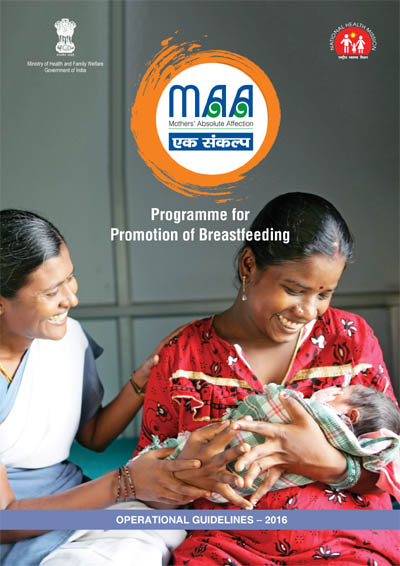In 2016, the Government of India launched the Mothers Absolute Affection (MAA) programme alongwith and its guidelines and renewed its commitment to improve breastfeeding in the health facilities.
The MAA programme guidelines and the WHO guidance with the revised “Ten Steps to Successful Breastfeeding” urge hospitals to follow some policies and practices, like  e.g. implementing the Infant Milk Substitutes, Feeding Bottles and Infant Foods (Regulation of Production, Supply and Distribution) Act 1992, and Amendment Act 2003(IMSAct), written breastfeeding policy, data management system, competent staff by training of staff in breastfeeding counselling, antenatal counselling on breastfeeding, support at birth to initiate breastfeeding, breastfeeding friendly practices like rooming-in, avoiding foods other than breastmilk unless medically indicated etc.
e.g. implementing the Infant Milk Substitutes, Feeding Bottles and Infant Foods (Regulation of Production, Supply and Distribution) Act 1992, and Amendment Act 2003(IMSAct), written breastfeeding policy, data management system, competent staff by training of staff in breastfeeding counselling, antenatal counselling on breastfeeding, support at birth to initiate breastfeeding, breastfeeding friendly practices like rooming-in, avoiding foods other than breastmilk unless medically indicated etc.
According to MAA Programme:
“Breastfeeding within an hour of birth could prevent 20% of newborn deaths. Babies who are exclusively breastfed for the first six months of age are 11 times less likely to die from diarrhoea and 15 times less likely to die from pneumonia, which are two leading causes of death in children under-five years of age. Much remains to be done to make exclusive breastfeeding during the first six months of life the norm for infant feeding and achieve high coverage. …To improve the breastfeeding and child feeding practices in the country, it has been decided to implement a nationwide programme named - ‘MAA’ (Mothers’ Absolute Affection) across States/UTs, starting from August 2016.”
Criteria for Assessment and Awards to Health Facilities
The MAA programme provides following criteria for Accreditation (award) of Health Facilities. Achievements should be sustained for 6 months at least. BPNI-WHO-Government of India tools have been developed to assess these standards.
- Have a written breastfeeding/IYCF policy (as per National IYCF guidelines of MoHFW) that is routinely communicated to all health care staff.
- Train all health care staff in skills necessary to implement this policy.
- Inform all pregnant women about the benefits and management of breastfeeding.
- Help mothers initiate breastfeeding within one-hour of birth.
- Show mothers how to breastfeed and how to maintain lactation, even if they should be separated from their infants.
- Give newborn infants no food or drink other than breast milk unless medically indicated.
- Practice rooming-in - allow mothers and infants to remain together - 24 hours a day.
- Encourage breastfeeding on demand.
- Give no artificial teats or pacifiers (also called dummies or soothers) to breastfeeding infants.
- Link mothers to trained ANM in the community on discharge from the hospital or clinic.
How the hospitals be monitored?
According to the MAA programme Guidelines:
“The monitoring of the ongoing efforts to strengthen facilities would be undertaken by assessors for nominated facilities …….. . A pool of assessors would be created at State/District level, under the oversight of the NTSU. The assessors would be qualified personnel, trained and willing to carry out assessment of high case load delivery points regarding IYCF/breastfeeding counselling.